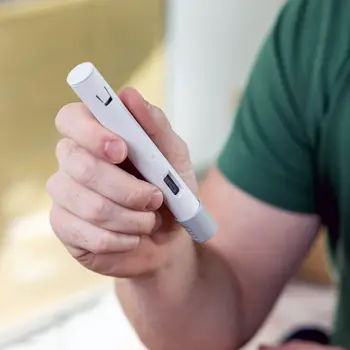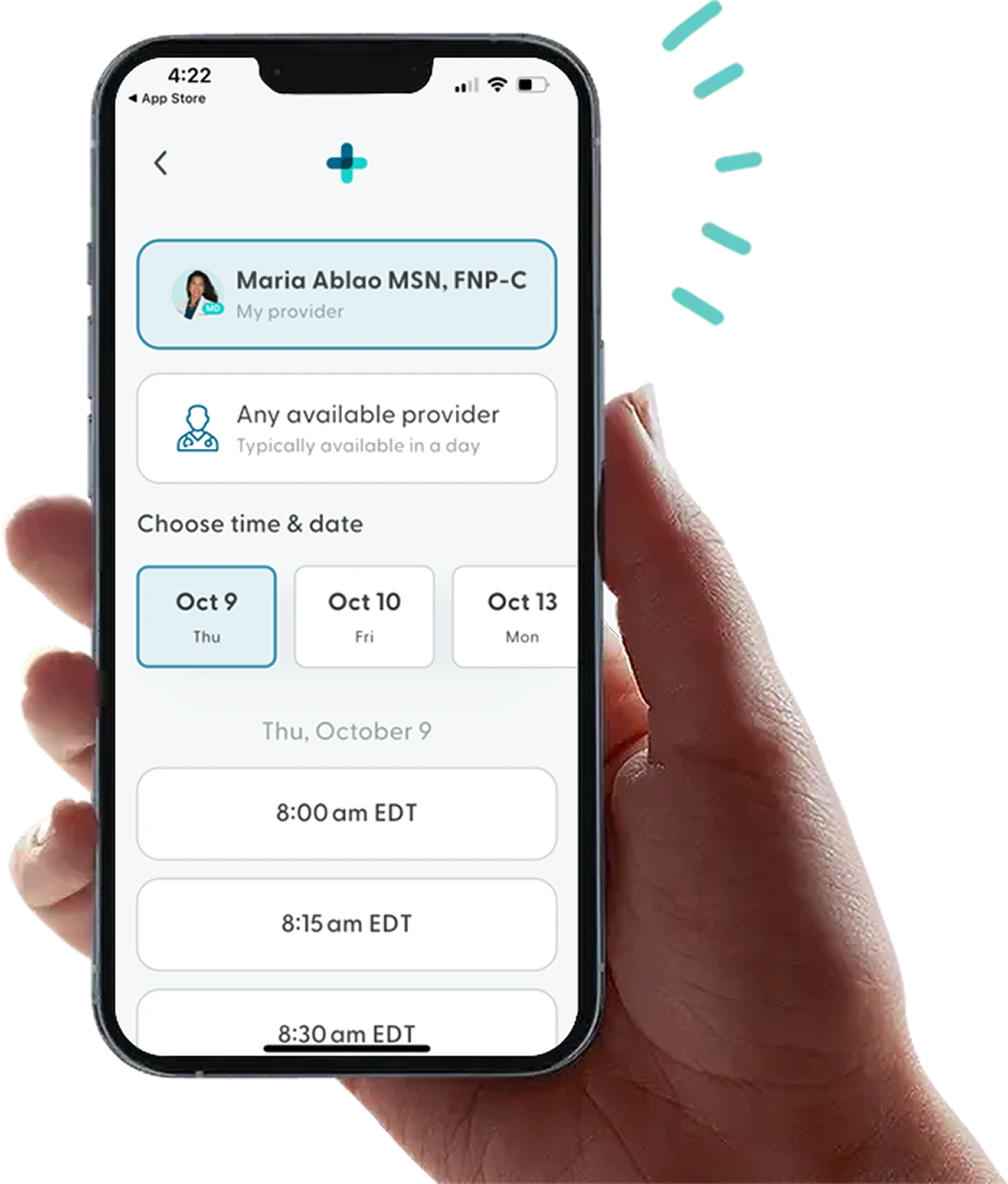Does Drinking Baking Soda to Lose Weight Work?
In the search for simple and effective ways to lose weight, many people try home remedies to help them reach their goals.
One common approach is drinking baking soda, which is thought to increase fat burn to help you shed excess pounds.
However, this can also contribute to several health concerns, which can negatively impact your quality of life.
That’s why understanding the science behind adding baking soda to your diet for weight loss can help you do it safely and healthily.
In this article, we’ll look at what the research says about baking soda and fat loss, the side effects you may experience, and tips for sustainable weight management.
Get prescription weight loss medication online.
Find out if you're eligible for GLP-1s, and get started on your weight loss journey for as low as $75/month.


The Theory Behind Baking Soda for Weight Loss
Baking soda — or sodium bicarbonate — is a familiar household product with several cooking and cleaning applications.
Recently, some theories about baking soda’s potential impact on weight loss have gained traction.
These theories suggest that baking soda can affect digestion and metabolism to promote weight loss.
It’s thought that baking soda can neutralize stomach acid to reduce bloating and accelerate digestion, which may lead to a temporary slimmer appearance and an illusion of weight loss.
However, it’s important to note that more evidence is needed to support baking soda’s possible weight loss abilities.
Potential Benefits of Baking Soda for Weight Loss
May improve exercise performance
Some studies indicate that baking soda acts as a buffer against lactic acid buildup in muscles from intense exercise.
Lactic acid is a chemical produced by the body that causes muscles to become fatigued and sore during physical activity.
Baking soda’s potential ability to reduce lactic acid may help you exercise longer or at a higher intensity before your muscles become tired.
This can also increase the number of calories burned, which indirectly aids your weight loss efforts.
May aid digestion
As we’ve mentioned before, baking soda may help neutralize stomach acid to aid digestion and reduce bloating.
An improved digestive process may help the body absorb and expel food faster, which may give you the impression that you’ve lost weight.
Reduced bloating can also contribute to a slimmer physique, giving you the appearance of having lost weight.
Baking soda’s potential effects on digestion don’t extend to fat loss, which is an important element in shedding excess pounds and becoming more toned.
May aid alkalinity
There is some research that indicates drinking baking soda may alter the body’s pH levels and make it more alkaline.
This might make it easier for individuals to stick to the alkaline diet theory, which proposes that reducing body pH levels can improve fat breakdown.
It’s important to note that the body usually regulates pH on its own and the effect of dietary changes on this balance is minimal.
Can potentially help control appetite
Some individuals claim that drinking baking soda water helps them feel fuller for longer or reduces their appetite.
This leads to a calorie deficit — which is when you burn more calories than you consume — and can promote weight loss.
However, there is currently no scientific evidence to support these claims, and this feeling of fullness may be attributed to a placebo effect.
Risks and Side Effects of Drinking Baking Soda
Electrolyte imbalance
Baking soda is high in sodium, which can disrupt the balance of electrolytes in your body when consumed in large amounts.
An electrolyte imbalance can cause headaches, fatigue, and muscle weakness. In severe cases, it can also be life-threatening.
Individuals with kidney disease, high blood pressure, or heart conditions should be cautious of this potential side effect, as their bodies struggle to manage extra sodium.
Alkalosis
Ingesting baking soda in an attempt to alter your body’s pH can lead to alkalosis — a condition where the body becomes too alkaline.
Symptoms of alkalosis can include nausea, vomiting, hand tremors, and muscle twitching. If left untreated, it can also cause convulsions.
Gas-related issues
Drinking baking soda can lead to an increase in the production of gas, which can contribute to bloating and belching.
This isn’t inherently dangerous, but it can be uncomfortable and embarrassing — especially in social settings.
However, if excess gas is trapped and can’t escape, it may become life-threatening by causing the stomach to rupture.
Interaction with medications
Baking soda may interact with various medications — including prescription and over-the-counter (OTC) drugs — and affect their absorption and efficacy.
Individuals taking medication for chronic conditions should first speak to their doctor about consuming baking soda to avoid any complications.
Increased risk for certain health conditions
Regularly consuming excessive amounts of baking soda may increase your risk of developing certain conditions, especially heart or kidney-related issues.
This is because of the high sodium content in baking soda that can increase blood pressure and put additional strain on the kidneys and heart.
Ready to achieve your weight loss goals?
Shed pounds with GLP-1 medication prescribed online by licensed healthcare providers for as low as $75/month.


Alternatives to Drinking Baking Soda for Weight Loss
While it may be tempting to give into “easy” solutions to shed excess body fat — such as drinking baking soda — sustainable weight loss requires a more comprehensive approach.
Making dietary and lifestyle changes and getting more regular exercise are proven ways to help you lose weight and keep it off for good.
Let’s take a closer look at how you can lose weight with healthy strategies.
Dietary changes
One of the most important steps you can take toward losing weight is adjusting your diet. It’s important to focus on whole, unprocessed foods as much as possible, including:
Eating more fruits and vegetables
Focusing on consuming more lean protein, such as chicken breasts, eggs, and fish
Incorporating more whole grains into your meals, such as quinoa or brown rice
You should also be mindful of your portion sizes to help you manage your caloric intake and create the deficit up required for weight loss.
You can do this by using smaller plates and bowls, learning to recognize hunger cues, and ensuring that your meals are packed with nutrients to keep you fuller for longer.
Increased physical activity
In addition to dietary adjustments, increasing your physical activity is essential for sustained weight loss.
Not only does physical activity boost your metabolism, but it also helps you burn calories and lose fat, giving you a leaner appearance.
Try to aim for at least 150 minutes of moderate aerobic activity or 75 minutes of vigorous activity each week.
This can be done using a variety of exercises, including running, walking, pilates, and swimming.
It’s also recommended to incorporate at least two sessions of resistance training into your weekly workout routine to promote strong joints and muscles.
Key Point: How to Incorporate Movement into Your Daily Routine
Many people struggle to find the time for exercise. However, there are many easy ways to increase your movement throughout the day to help you burn more calories.
These strategies include:
- Taking the stairs instead of the elevators
- Walking or biking to work, if possible
- Investing in a standing desk or walking pad
- Parking further away when go shopping
All these activities add up to your NEAT — or nonexercise activity thermogenesis — calories, which are essential for sustained weight loss without intense exercise.
Lifestyle adjustments
Another important and often overlooked element of weight loss is leading a healthy lifestyle. This goes beyond just improving your diet and increasing your workout frequency; it should also include:
Prioritizing quality sleep to help reduce cravings and stabilize hormones
Managing stress to avoid cortisol spikes, which can contribute to weight gain
Adopting a mindful eating approach
Drinking enough water
Adding apple cider vinegar or lemon juice to warm water for a nutritious drink
Making these small but sustainable changes goes a long way to ensuring a consistently healthy lifestyle and helping you achieve your weight loss goals.
When Should You See a Doctor About Your Weight?
While it’s not always necessary to consult your doctor about weight loss, it’s important to know which circumstances may require professional attention.
It’s recommended to make an appointment with your doctor if you experience the following:
Significant and unintended weight changes
Struggling with weight management despite lifestyle and dietary changes
Being diagnosed with conditions like diabetes, hypertension, or high cholesterol
Symptoms of an eating disorder, such as extreme calorie restriction, binging and purging, or an obsession with food and body image
Significant reduction in your quality of life because of weight issues
Experiencing these issues may indicate a serious underlying health condition that requires professional treatment to improve your quality of life and avoid further complications.
Where Can You Learn More About Maintaining a Healthy Weight?
If you’re looking for more information on healthy habits to help you lose weight and improve your quality of life, LifeMD has got you covered.
With the LifeMD Weight Management Program, you’ll have access to innovative GLP-1 medications like Ozempic, Wegovy, and others. The program approaches weight loss comprehensively, pairing medications with ongoing clinical support and care, lab testing, and information that will help you drop pounds.
Get started today.
More articles like this
Feel better with LifeMD.
Your doctor is online and ready to see you.
Join LifeMD for seamless, personalized care — combining expert medical guidance, convenient prescriptions, and 24/7 virtual access to urgent and primary care.

GLP-1
Zepbound® Wegovy® Saxenda®
This is it! Be part of the weight loss movement everyone’s talking about.
Get Started Now








